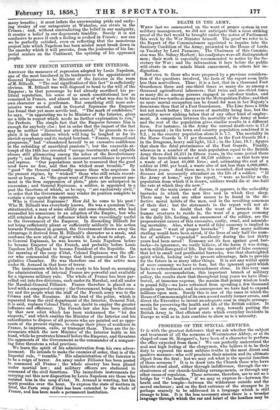DEATH IN THE ARMY.
WHEN last we commented on the want of proper system in our military management, we did not anticipate that a most striking proof of the fact would be brought under the notice of Parliament this week by the War Minister himself. The proof we refer to is the Report of the Commissioners appointed to inquire into the Sanitary Condition of the Army, presented to the House of Lords on Tueiday by Lord Panmure. The Chairman of this Commis- sion was Mr. Sidney Herbert ; his coadjutors were all distinguished men ; their work is especially recommended to notice by the Se- cretary for War ; and the information it lays before the public will create in some minds blank amazement, in others hot in- dignation.
But even to those who were prepared by a previous considera- tion of the questions involved, the facts of the report seem little less than marvellous. Thus : it is a fact, that in a thousand Foot Guardsmen three and one-third times as many die as among a thousand agricultural labourers ; that twice and one-third times as many die as among persons engaged in out-door trades, and twice and two-tenths as many as in the Metropolitan Police ; and that no more mortal occupation can be found for man in her Majesty's dominions than that of a Foot Guardsman. The Line fares a little but not much betterthe excess of mortality being less, but the mortality never sinking below that of any other kind of employ- ment. A comparison between the mortality of the Army at home and the rest of the population gives similar results in a different form. For instance, in the Army the annual death-rate is 17.5 per thousand ; in the town and country population combined it is 9.2. ; in the country population alone it is 7.7. The mortality in the Horse Guards is 11 per thousand, in the Foot Guards 20.4 ; in the Dragoons, heavy and light, 13.3 ; in the Line, 18.7 ; figures that show the fatal preeminence of the Foot Guards. Finally, whereas in a number of the male population equal to the British Army there died 16,211 in fifteen years, in the same period there died the incredible number of 58,139 soldiers : so that here was a waste of at least 40,000 lives ; and, estimating the cost of a soldier at 1001. per head, a waste also of not less than 4,000,0001. in fifteen years. And these men, it is recorded, died mainly from diseases not necessarily attendant on the life of a soldier. " If the Army at home," says the report, " were as healthy as the population from which it is drawn, soldiers would die at one-half the rate at which they die now."
One of the main causes of disease, it appears, is the unhealthy barracks in which the men live and in which they sleep. Theie may be and are other causes to be found in the de- fective moral habits of the men, and in the revolting sameness of their diet ; but the statements in the report will not al- low any one to doubt that the want of barracks fit for human creatures to reside in, the want of a proper economy in the daily life, feeding, and amusement of the soldier, are the preponderant causes of this excessive, costly, cruel, and astonish- ing mortality. Alas, what a world a false economy is implied in the phrase want of proper barracks" ! How many millions sterling would have been saved, if the lives of only half the num- ber of soldiers " expended" needlessly during the last thirty years had been saved ! Economy set its face against good bar- racks—in ignorance, we verily believe, of the harm it was doing, not in wilful disregard of life. But the same spirit of false economy that led to small and pestilential barracks, was that shortsighted spirit which, looking only to present advantage, fails to provide for the future in so many other things. It is not any wilful spirit of mere economy we have to fear, but the ignorant spirit which looks to retrenchment and retrenchment alone. In this very case of barrack accommodation, this important branch of military policy, the results show that throughout long years we have illus- trated, at immense expense, the maxim that penny wisdom leads to pound folly—we have refrained from spending a few thousand. pounds upon barracks, and in consequence we have had to expend millions upon men. Surely this is one of the cases in which the House of Commonsmight of its own accord rectify former errors, and direct the Executive to invest an adequate sum in simple arrange- ments for preserving the health and life of the British soldier. It would be one step, and how great a step, towards putting the British Army in that efficient state which everyday incidents in Europe as well as in Asia combine to show us is a necessity.


























 Previous page
Previous page